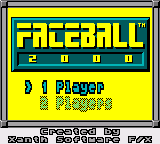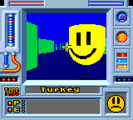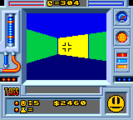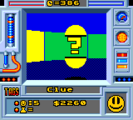Difference between revisions of "Faceball 2000"
From Sega Retro
(→Smiloids: added sprites) |
|||
| Line 4: | Line 4: | ||
| developer=[[Xanth Software]], [[Bullet-Proof Software]] | | developer=[[Xanth Software]], [[Bullet-Proof Software]] | ||
| system=[[Sega Game Gear]] | | system=[[Sega Game Gear]] | ||
| − | | sounddriver= | + | | sounddriver= |
| peripherals=[[Gear-to-Gear Cable]] | | peripherals=[[Gear-to-Gear Cable]] | ||
| players=1-2 | | players=1-2 | ||
Revision as of 10:58, 21 May 2024
| Faceball 2000 | ||||||||||
|---|---|---|---|---|---|---|---|---|---|---|
| System(s): Sega Game Gear | ||||||||||
| Publisher: Riverhillsoft | ||||||||||
| Developer: Xanth Software, Bullet-Proof Software | ||||||||||
| Peripherals supported: Gear-to-Gear Cable | ||||||||||
| Genre: Action[1][2] | ||||||||||
| Number of players: 1-2 | ||||||||||
| ||||||||||
|
Faceball 2000 (フェイスボール2000) is a Sega Game Gear game developed by Xanth Software as a sequel to the Atari ST game, MIDI Maze. The Game Gear version of the game was only released in Japan.
The game is notable for being a first-person shooter, a genre that is typically said to be too processor intensive for systems such as the Game Gear.
Contents
Gameplay
The game is a first-person shooter set in a virtual reality where players take control of a Holographically Assisted Physical Pattern Yielded For Active Computerized Embarkation (HAPPYFACE). Players walk around a 3D maze to shoot other players or computer-controlled enemies called Smiloids. The player moves through the maze with the D-pad and shoots a ball with ![]() . The player can use pods, which provide hints and items, with
. The player can use pods, which provide hints and items, with ![]() . The player can pause the game and bring up a map of the maze with START . There are two modes, Cyberspace and Arena.
. The player can pause the game and bring up a map of the maze with START . There are two modes, Cyberspace and Arena.
Cyberscape mode consists of 70 levels with the objective to find the exit (a flashing door) before time runs out. Gameplay involves shooting enemies and finding keys to open doors. New gameplay mechanics, such as switches and teleports, and enemies are introduced as the game progresses. Enemies are initially harmless but become hostile as the game goes on. The game identifies the type of enemy for the player when the enemy is highlighted by the targeting cursor. There is no save feature, but the selected difficulty determines the starting level: Very Easy starts on level 1, Easy starts on level 11, Average starts on level 21, Hard starts on level 31, Very Hard starts on level 41, and Radical! starts on level 51. The player earns points for clearing a level and bonus points for time remaining. The player can also collect coins to earn points. Every $1,000 gains an extra life.
Arena is a deathmatch mode with 15 different mazes and a set number of enemies depending on the chosen difficulty level. It can be played against the computer or against another human player over a Gear-to-Gear Cable. The first player to get ten tags wins. Players can choose from four difference face shapes in the options.
The player has three hit points, which is indicated by a smiley face in the HUD. The player can acquire power-ups that increase the number of hit points. The HAPPYFACE dies if it runs out of hit points or if the player runs out of time in Cyberspace mode. The player has limited lives in Cyberspace mode; the player restarts the level after losing a life, and the game ends if there are no more lives remaining. The player has unlimited lives and respawns after a delay in Arena mode.
Items
Items are found in pods.
| Shield (シールド) | |
|---|---|
| Makes the player temporarily invincible. | |
| Freeze (フリーズ) | |
| Temporarily freezes enemies in place. | |
| Camouflage (カモフラージュ) | |
| Renders enemies temporarily unable to attack. | |
| Band Aid (バンドエイド) | |
| Heals the player. | |
| Life (ライフ) | |
| Gives the player an extra life. | |
| Map (マップ) | |
| Displays the positions of enemies on the map. | |
| Hint (ヒント) | |
| Provides a gameplay hint. | |
| Coin (コイン) | |
| Gives the player bonus points. | |
| Key (キー) | |
| Opens a locked door. | |
| Armor (アーマー) | |
| Gives the player another hit point. | |
| Auto-Mag (オートマグ) | |
| Increases the player's attack speed. | |
| Speed Up (スピードアップ) | |
| Increases the player's movement speed. |
Smiloids
Smiloids are computer-controlled enemies.
Hit points are the number of shots that a Smiloid can take before it is defeated. The game rates Smiloids from A (best) to C (worst) on movement speed, attack speed, and sensitivity. Sensitivity rating is how close the Smiloid needs to be to the player before it reacts.
| Shoot Me (シュート・ミー) | |
|---|---|
|
Hit points: 1 Movement speed: n/a Attack speed: n/a Sensitivity: n/a | |
| Spins around and does nothing. | |
| Shoot Me2 (シュート・ミー2) | |
|
Hit points: 1 Movement speed: C Attack speed: n/a Sensitivity: n/a | |
| Self-destructs when touched by the player. | |
| I Shoot U (アイ・ジュート・ユー) | |
|
Hit points: 1 Movement speed: n/a Attack speed: C Sensitivity: n/a | |
| Spins around and shoots if the player shoots first. | |
| I Shoot U2 (アイ・シュート・ユー2) | |
|
Hit points: 1 Movement speed: C Attack speed: C Sensitivity: n/a | |
| Moves and shoots if the player shoots first. | |
| Turkey (ターキー) | |
|
Hit points: 1 Movement speed: C Attack speed: C Sensitivity: C | |
| Slow-moving but shoots even if unprovoked. | |
| Gremlin (グレムリン) | |
|
Hit points: 2 Movement speed: B Attack speed: n/a Sensitivity: C | |
| Chases the player and self-destructs on contact. | |
| Rover (ローバー) | |
|
Hit points: 3 Movement speed: B Attack speed: C Sensitivity: C | |
| Faster-moving and more aggressive. | |
| Bouncer (バウンサー) | |
|
Hit points: 3 Movement speed: A Attack speed: B Sensitivity: B | |
| Fastest-moving and most aggressive. |
Magazine articles
- Main article: Faceball 2000/Magazine articles.
Promotional material
Physical scans
| Sega Retro Average | |||||||||||||||||||
|---|---|---|---|---|---|---|---|---|---|---|---|---|---|---|---|---|---|---|---|
|
| 64 | |
|---|---|
| Based on 3 reviews | |
Technical information
ROM dump status
| System | Hash | Size | Build Date | Source | Comments | |||||||||
|---|---|---|---|---|---|---|---|---|---|---|---|---|---|---|
| ? |
|
256kB | Cartridge (JP) |
References
- ↑ 1.0 1.1 http://sega.jp/fb/segahard/gg/soft_licensee.html (Wayback Machine: 2013-01-01 20:24)
- ↑ File:FaceBall2000 GG JP Box Front.jpg
- ↑ Beep! MegaDrive, "January 1994" (JP; 1993-12-08), page 28
- ↑ Hippon Super, "December 1993" (JP; 1993-11-02), page 43
- ↑ Sega Saturn Magazine, "September 1995" (JP; 1995-08-08), page 88
NEC Retro has more information related to Faceball
|
| Faceball 2000 | |
|---|---|
|
Main page | Comparisons | Maps | Hidden content | Magazine articles | Reception | |










